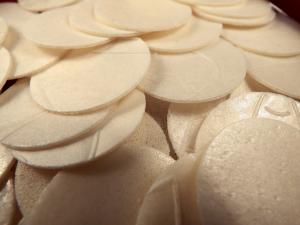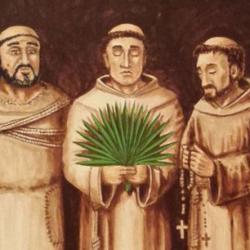When I was a child we lived in the country side about 20 miles south of the city of Lima. We would attend Sunday Mass at any one of many chapels around our house, but occasionally we would drive into town to the beautiful, old, colonial church built in 1703.
I clearly recall one time asking my mother right before communion while at Mass in this beautiful church:
“Does the priest ever run out of hosts?”
She gave me a quick and hushed response, “No, Pablo, he never does.”
My seven year old mind registered her answer with utter amazement. The priest never runs out of hosts! God must miraculously keep putting hosts in there! In my little mind, I imagined angels dropping hosts into the ciborium to make sure there were plenty of them.
Though this would be an amazing thing, and technically nothing could keep God from multiplying hosts if He so desired, even more amazing, is what ordinarily happens every time Mass is celebrated.
Tonight, we commemorate with utter amazement the tremendous gift Jesus gave us the night before He suffered and died: the gift of Himself in this sacrament where He gives Himself to us as food for the journey.
Tonight, we recall the events of the Passover meal many years ago when Jesus transformed the ancient rite of our ancestors, so that He would remain present in the midst of every future disciple, including you, including me.
Saint Athanasius, a great saint of the early church, wrote, “God became man so that man could become God.” Whenever we approach the altar, we become what we eat. God comes to us to lift us up to Himself, and we share in His divinity, as He has shared in our humanity in Christ.
How is it that our lives are different because we have received this great gift of Jesus in the Eucharist? Week after week, for some, day after day? If we did not have this great gift, would we feel something missing in our lives? The Eucharist matters, so our lives should be different because we receive the Body and Blood of Christ. Our lives are different because God raises each of us up to Himself.
Our lives are different because this gift of the Eucharist allows us to receive and embrace the unconditional love that Christ gives us. A humble, sacrificial love beautifully signified by Jesus washing his disciples’ feet.
The Eucharist allows husbands to love their wives unconditionally, and vice versa; parents to love their children unconditionally, and vice versa. It allows us to love coworkers, acquaintances, friends, relatives, and strangers. It allows us to love those who annoy us, those who hurt us or frighten us. Those most unlike us, and those we disagree with. It allows us to see each person as God sees them.
We worship a God who has come into the world to wash our feet, and we are challenged to do the same. The Eucharist is a unique and intense union with God that demands a response. It is not simply a ritual or special intimate moment: to receive the Body and Blood of Christ demands that we express the same radical, unconditional love of Jesus to others.
Saint John Paul II wrote that the criterion by which the authenticity of our Eucharistic celebrations is judged is how we practice mutual love, and in particular, how we express concern toward those most in need. The authenticity of what we do in here is at stake if we do not take what we do in here out into the world. We too must wash the feet of others.
I remember many years ago walking with my mother towards the priest surrounded by colonial altars filled with statues of saints, and watching in awe at her receiving something I could not yet receive. I stood beside her, looking up, admiring this mysterious food.
Pray that we never lose the wonder and awe that the Eucharist instills in us. That we always treasure the gift Jesus gave us on a night like tonight. That we may never forget that God lifts us up to Himself, and calls us to practice the same selfless love He has shown by washing his disciples’ feet.
Picture from the public domain
Holy Thursday Homily














